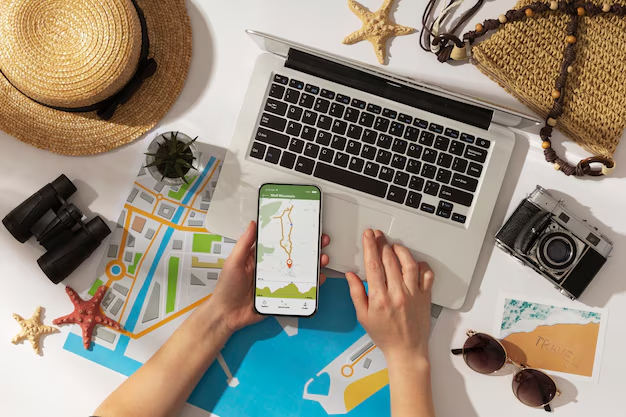In the past, travel was often a stressful and time-consuming process. From booking tickets to finding accommodation, travelers had to rely on traditional methods like phone calls, paper maps, and travel agents. However, the rise of technology has revolutionized the way we travel, making the process more efficient, convenient, and enjoyable. Today, technology plays a significant role in almost every aspect of travel, from trip planning to transportation, accommodation, and beyond.
1. Digital Booking Platforms
One of the most significant changes in the travel industry has been the introduction of online booking platforms. Websites and apps like Expedia, Booking.com, and Airbnb allow travelers to book flights, hotels, and rental cars with just a few clicks. These platforms offer real-time availability, price comparison, and user reviews, making it easier for travelers to find the best deals and accommodations that suit their needs.
2. Mobile Travel Apps
Mobile apps have become indispensable for modern travelers. From navigation apps like Google Maps to translation tools and currency converters, smartphones are now essential travel companions. These apps provide real-time updates on flight statuses, help you navigate foreign cities, and even allow you to find local restaurants and attractions based on user ratings. Travel-specific apps like TripIt and Skyscanner also make organizing your itinerary and finding deals more accessible than ever.
3. Contactless Payments

The rise of digital payment methods such as Apple Pay, Google Pay, and mobile banking apps has transformed the way we manage money while traveling. These contactless payment methods allow travelers to make purchases without carrying cash or worrying about currency exchange. Credit cards and smartphones with NFC (Near Field Communication) technology make it easy to pay for everything from souvenirs to transportation and meals while keeping transactions secure and fast.
4. Virtual and Augmented Reality
Virtual and augmented reality (VR and AR) technologies have introduced new ways to experience travel before and during the trip. Many tourism boards and hotels use VR to offer virtual tours of destinations, accommodations, and attractions. This allows potential visitors to preview their experience before booking. AR, on the other hand, is used in apps like Google Lens to provide additional information about landmarks, museums, and historical sites as travelers explore.
5. Smart Luggage
Smart luggage has gained popularity in recent years, offering a range of features that make traveling more convenient. Many smart suitcases come equipped with built-in GPS tracking, allowing travelers to track their luggage in case it gets lost. Other features include USB charging ports, biometric locks, and even self-weighing capabilities to help avoid overweight baggage fees. These innovations have made traveling with luggage more efficient and secure.
6. Artificial Intelligence and Personalization
Artificial intelligence (AI) is playing an increasingly important role in travel, helping to personalize the traveler’s experience. Many travel companies are now using AI-powered chatbots to assist customers with booking, answering queries, and providing personalized recommendations. For example, AI-driven travel apps can suggest destinations based on a traveler’s preferences, past trips, and current trends, making the planning process more tailored and intuitive.
7. Sustainable Travel Solutions
Technology has also contributed to the growing trend of sustainable travel. With apps like Green Travel and websites that focus on eco-friendly options, travelers can now easily find carbon-neutral hotels, electric vehicle rental services, and environmentally-conscious activities. Additionally, advancements in electric and hybrid transportation technologies are helping reduce the carbon footprint of travel, allowing travelers to make more eco-friendly choices while still enjoying their trips.
Conclusion
Technology has had a profound impact on the travel industry, making it easier, more enjoyable, and more efficient for travelers around the world. From booking and payment solutions to AI-powered recommendations and VR experiences, technology continues to shape how we travel. As technology evolves, we can expect even more innovative tools and services that will further enhance our travel experiences and contribute to a more connected, accessible, and sustainable world of travel.
FAQs
1. How has technology changed the way we book travel?
Technology has made booking travel much more accessible through digital platforms, offering real-time availability, easy price comparison, and user reviews. This has simplified the booking process and made it more convenient.
2. What are some of the best apps for travelers?
Some of the best travel apps include Google Maps for navigation, TripIt for organizing itineraries, Skyscanner for finding flight deals, and Google Translate for overcoming language barriers.
3. How do virtual and augmented reality benefit travelers?
Virtual reality allows travelers to take virtual tours of destinations and accommodations, while augmented reality apps enhance real-time experiences by providing additional information about landmarks and sites.
4. What are smart luggage features?
Smart luggage often includes GPS tracking, biometric locks, USB charging ports, and self-weighing capabilities, providing added convenience, security, and functionality for travelers.
5. How is technology helping with sustainable travel?
Technology aids sustainable travel by offering eco-friendly accommodation options, electric vehicle rentals, and apps that highlight environmentally-conscious activities, helping travelers make more sustainable choices.
